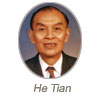Li Hui, born in 1966 in Jinan City, Shandong Province, received her PhD degree in engineering mechanics at Harbin Institute of Technology in 1994 and was promoted to full professor in 1998. Prof. Li was a visiting professor/scholar in California Institute of Technology, Kyoto University, etc. Currently she is a Changjiang Scholarships Professor, an Academic Leader of Changjiang Scholar Innovative Group and a Distinguished Young Scholar of National Natural Science Funds.
Prof. Li serves as senior members in a number of academic societies and chairs of international conferences and is on the editor board of several international and domestic journals. She has published 2 monographs, 150 publications in refereed journals and technical conferences, including 60 of SCIindexed, and 10 keynote lectures at international conferences.
Prof. Li has been studying structural health monitoring, structural control, smart materials and structures, wind engineering and earthquake engineering. The major scientific achievements include the following parts:
1. She developed smart sensing technology, wireless sensing technology, and PZT damage detection technology; proposes a compressive sampling approaches, information fusionbased damage detection approaches, fractalbased damage detection approaches; set up a framework on safety evaluation of structures based on SHM, reliability analysis and durability analysis together; proposed model based and datadriven approach for earthquake damage detection.
2. She investigated indepth the intelligent control of stay cable, proposed control algorithm for distributed parameter system using limited observation, derived critical negative stiffness of intelligent control of stay cable and the corresponding optimal damping ratio, and conducted the first real application of magneto rheological semiactive of stay cable in the world. The evaluation method was proposed to quantify the capacity of semiactive control and passive control achieving the performance of active control. The uniform design methodologies of structural control systems were established.
3. Prof. Li Researched nanoconcrete and its properties, such as electroforce, sensing properties, fatigue, wear and durability; developed the earthquake selfrecentering structure, the nanofluid and biferroic materials, and CNFPbased intelligent selfheating deicing or snowmelting road system utilizing solar energy and selfenergy, and also studied the electrothermal properties of CNFP.
4. She developed ultrasonic transmission monitoring system of windraininduced vibration of stay cable, nonlinear aerodynamic model, multimodal vibrations of stay cable under shear flow; studied the flow filed characteristics of the vortexinduced vibration in longspan bridges; proposed hybrid substructure method combined with CFD numerical simulation and physics experiments.






